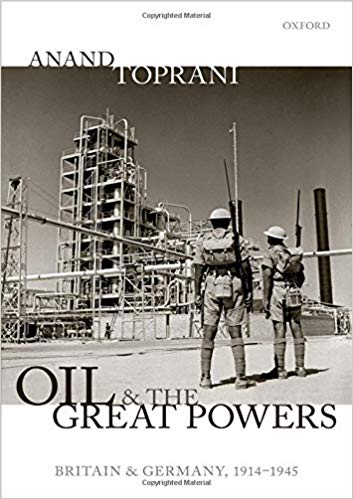

Since the beginning of the twentieth century, oil has been central to geopolitics, diplomacy, and the economy during times of both war and peace. As a result, Anand Toprani’s work is relevant not just as a study of the period bookended by the two world wars, but also as a basis for understanding the great power politics of today. In Oil and the Great Powers: Britain and Germany, 1914-1945, Toprani unpacks the complex ways in which this crucial natural resource has driven political decision-making by following a substantial cast of characters—politicians, businessmen, workers, natural resources, states, and oil companies—who are typically relegated behind the scenes of major events. With oil as the emulsifying ingredient, this approach not only gives a voice and appropriate agency to these actors but also unpacks traditional historical narratives during the period and offers a more dynamic picture.
Toprani situates his work in the context of the twentieth century’s most significant change in the energy world—the transition from coal to oil. This transformation was revolutionary during the world wars, yet efforts to secure access to oil in the interwar period were equally important. The dominance of oil impacted the global balance of power as Britain and Germany – both of which lacking a domestic oil source—had to compete with the United States and the Soviet Union. Toprani’s decision to focus on these two states stems from this shared disadvantage, though the comparative case study also presents important differences between German and British approaches to overcoming their petroleum deficiencies. Britain sought energy security largely through isolationism and, though it had plenty of petroleum through its colonies, it battled other states and corporations to secure prices and access. Germany, on the other hand, had to resort to less efficient domestic fuel alternatives, at least temporarily, while it tried to negotiate oil imports from states such as Romania. Ultimately, whether because of a lack of control over such resources, their relationships with oil companies, and their fraught relations with oil producing states, neither Britain nor Germany was ever in an energy secure position.
Oil and the Great Powers makes a convincing case for the importance of using oil as a tool to unpack critical diplomatic, geopolitical, and economic moments in the global twentieth century. The section on Britain focuses on the politics of petroleum companies Shell and Anglo-Persian. It frames these in the context of the interwar era, when Britain sought to diversify its petroleum supplies and become less dependent on imports from the United States. One of the biggest challenges facing Britain, according to Toprani, concerned divided factions within Whitehall, the British government, that debated whether to create an “all-British” oil company independent of any foreign control. In light of its declining geopolitical position and its desire to safely procure oil, Britain ultimately decided to allow foreign investment in its colonial empire. Whether one attributes Britain’s decline to domestic or external issues, Toprani makes clear that oil must be at the center. The series of crises Britain faced accessing oil, such as Mexico’s complete nationalization of petroleum in 1938 or negotiations over royalties with the Shah in Iran in 1932, in addition to Whitehall’s own shortcomings in mediating between oil companies and other states reveal more failures than successes.
Though the chapters on Britain are plentiful with detail, it is the German section that stands out for its effective integration of the complex history of Germany and oil into a single, comprehensible narrative. During World War I, Germany and Austria competed for Romanian oil. After the war, this struggle motivated the Third Reich to consolidate control over its domestic companies—first and foremost in pursuit of developing synthetic petroleum—while expropriating oil firms in Romania. Toprani offers a compelling narrative, stressing that examining Germany’s relationship with petroleum allows for a more nuanced and complete picture of the state’s strength at the beginning of World War II. The early period of the war is often noted as largely a German success story. However, Toprani underscores how the invasion of France between May and June of 1940 actually hampered Germany’s access to petroleum and put its wartime ambitions in serious jeopardy. For Germany, the period from 1939 to 1941 was particularly challenging and chaotic considering its quickly diminishing reserves and unstable means of procurement. The British blockade made it difficult to import oil from Latin America, whereas transporting oil from Romania to the Third Reich—whether by rail, sea, or the Danube—was risky as well. In this context of energy insecurity, the German decision to invade the Soviet Union in June 1941 to access its oil fields in the Caucasus has just as much salience as other ideological and economic motivations. Here, Toprani effectively uses oil to interlace the politics of the industry, the context of war, and larger geopolitical issues into an interesting and clear narrative.
The story of Britain and Germany’s attempts to oil independence is ultimately one of failure. Instead, oil security would have to come at the expense of a degree of political autonomy, as it involved cooperating with other states and companies to preserve access and ensure consistent distribution. And with most failures, there are important lessons to be drawn which frame the narrative of the book. Oil independence was not only unfeasible for Britain and Germany—albeit for different reasons—but it might not have been a good thing were it ever achieved. As chiral examples to Britain and Germany, the experience of the United States and the Soviet Union, with their vast oil supplies, reveals issues as well. During the Cold War, the United States implemented import limitations, which increased domestic prices though lowered international ones, whereas the Soviet Union used its oil to increase industrial production while lowering the standards of living of its citizens. It may be unwise to assume that having vast amounts of vital natural resources is necessarily beneficial in the long run.
Anand Toprani’s Oil and the Great Powers successfully interlaces scholarship on Germany and Britain during the war with work on oil politics more broadly. In doing so, it shows the value of such integrated histories that complicate yet enrich traditional understandings of key historical and geopolitical events. It stresses how international relations shaped each state’s approach to oil and vice versa. More importantly, this work will hopefully serve as an impetus for a continuing examination of oil and other energy resources in order to further develop our understanding of crucial historical issues. Building on Toprani, future research should revisit historical moments in the twentieth century from the perspective of oil and study its role during decision-making processes that had far-reaching geopolitical implications.
Aleksandra Pomiecko is currently a Pearl Resnick Postdoctoral Fellow at the Jack, Joseph and Morton Mandel Center for Advanced Holocaust Studies at the United States Holocaust Memorial Museum. She received her PhD at the University of Toronto and is currently working on a book manuscript drawing from her dissertation, provisionally entitled Bound by Exclusion and Violence: Belarusian Nationalist Networks, 1921-1956. Her broader research interests focus on irregular war and transnational conflict, particularly in Eastern Europe.
Oil and the Great Powers: Britain and Germany, 1914-1945
By Anand Toprani
Publisher: Oxford University Press
Hardcover/336 pages/2019
ISBN: 9780198834601
Published on March 10, 2020.




